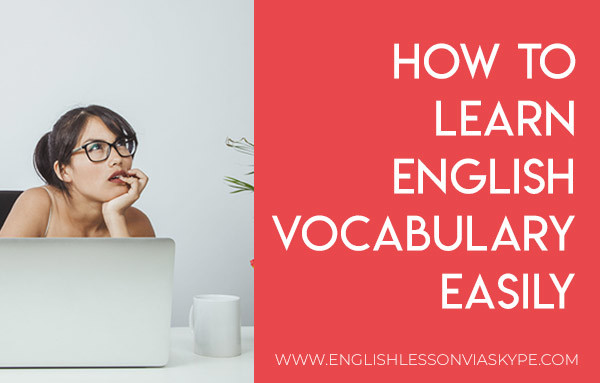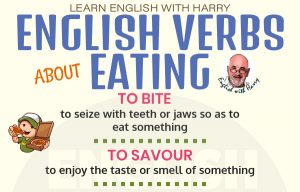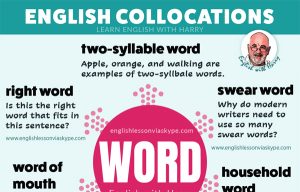How to learn English vocabulary easily? Or is there a way to learn English words and phrases easily?
Let’s talk about effective ways for learning English vocabulary and what you can do to improve it.
In the past few lessons, I’ve spoken to you about written English and how to improve that. I’ve also spoken to you about how to improve your conversational English and how to speak better English.
English like any other language is made up of words. It’s a series of words and we put all of those words into sentences. But on their own…. Okay, they have a meaning but they don’t make much sense unless you put them together and you know how to use them.
Table of Contents
Harry
How to Learn English Vocabulary Easily - 5 Tips
Many of my students have come to me and they want to learn words. ‘Give me more vocabulary. Give me more words give me 10 20 30 words to use every day.’
I try to avoid that mainly because it just doesn’t work. Okay.
So you can sit there with an English dictionary you can learn all the words you want to learn but I almost guarantee that within 24 hours you have forgotten most of them.
And the ones you do remember, you won’t know what they mean. All you’ll see is just a page of words and you’re trying to remember the word and try to guess what the meaning is.
Intermediate to Advanced English Marathon

INSANITY: doing the same thing over and over again and expecting different results.
Albert Einstein
- What you'll learn:
- better understanding of more complex grammar structures
- advanced English vocabulary words
- British & American slang
- perfect your listening skills through practing different accents
- This marathon is for you if you're:
- stuck at an intermediate English level
- tired of confusing explanations
- a mature student
- shy & introverted
So let’s look at it in a different way how to approach this, to get those words to have more meaning.
When you’re trying to learn English, you want to make sense, you want people to understand you. And the best way for them to understand you, is if you speak sensible English correct English using the correct word in the correct way.
So you have to understand the word and understand how to use it. So if you want to practise your words, then practise how to use that particular word either in an expression, in a sentence, in a paragraph, in an essay, some written work, whatever it might be.
I’m not telling you not to learn words. But I am suggesting and recommending that in addition to learning the words, you learn the true meaning and then how to apply them in your English.
Whether you’re at the lower intermediate level or intermediate or upper intermediate. It really doesn’t matter what level you’re at, you still have to have the same approach.
How to Learn English Vocabulary Easily
Exercise 1
I get my students to select a theme.
The theme can be absolutely anything. It could be a visit to the dentist, could be a visit to the hospital, it could be taking a boat trip.
Firstly, I get them to put down headings: nouns, adjectives, verbs. For those more advanced – adverbs and other expressions.
Then try to get them to identify those particular words connected with that theme. How many words can they think of connected that are nouns to the theme visit to the dentist? How many words are adjectives? With verbs is the same and so on.
So you then identified those words with the particular theme. When you’ve got those words, I then get my students to put them together in an essay or a written piece and try to use them in the correct way.
This is a much better way to remember the word and how to use it and how to apply it to that particular theme.
Exercise 2
The second example that I use when I talk to my students then is to get an article.
Pick an article from a magazine, a newspaper, even a book. It makes no difference. What you’ve got to do first of all, you’re going to read the article once just to get an understanding what does it mean or try to understand 60 65 percent.
When you’ve read it once, read it a second time. As you read through the second time I want you to highlight words and phrases you don’t know phrases you don’t understand.
When you come back to me at the next lesson, then you’ll have a list of all these words phrases and expressions and I’ll explain what they mean and how to use them.
Then we go back to the article and read it together and understand exactly what the author was trying to get at. This way you have a much better chance of understanding the words and certainly a much better chance of remembering them.
How to Learn English Vocabulary Easily
Exercise 3
The third exercise is connected with pronunciation. And you might be wondering how is that connected with words.
I take a number of words there might be 10 or 15 or 20 (depending on their particular level).
Firstly, we practise the pronunciation. We practise where the stress should be. But more importantly, we’re trying to understand what those words mean. As we’re going through each of the words I ask the student: ‘Do you know what it is? Can you understand it? Can you use it yourself?’
Having gone through each of the words, having put the correct stress on the correct syllable, we then go back to the words and we put them into a sentence.
How to Learn English Vocabulary Easily
Exercise 4
The fourth exercise I get my students to write short passages or an essay or a letter. It doesn’t really matter what it is but what I get them to do is to make sure they don’t repeat the key words more than once in each paragraph.
For example, you’re going to write a little passage about the holiday that you’ve had or the book that you just read. And you’re going to try and explain those feelings but don’t repeat the same key word more than once in each paragraph. It’s quite tough to do and it’s a great exercise to get you to understand, remember and use all of the words.

How to Learn English Vocabulary Easily
Exercise 5
The final tip that I have for you is practice. English only gets better if you practise it and particularly with words we want to practise words, we want to practise collocations, expressions and phrases.
For example, if we take the phrase ‘discharged from hospital’
That’s on its own it’s fine ‘discharged from hospital’. In a sentence ‘I was discharged from hospital yesterday.’ So I left hospital yesterday. You get an understanding of what it means and how to use it.
Another collocation ‘I have a splitting headache’. Splitting headache is the collocation. ‘I have splitting headache all day because of the weather.’ So practise how to use it an expression.
The room that I’m sitting in here is bright and cheerful. Bright and cheerful is the expression meaning colours are very nice, the decoration is wonderful. So when you come in you feel alive.
You have to find expressions, collocations, phrases and words and practise putting them into appropriate sentences so the meaning sticks with you.
That’s all for this particular lesson.
Remember to subscribe to my channel as always and join me on www.englishlessonviaskype.com.
When you look in the description, you’ll find a great link to all of our courses. And we’ve got some great news coming up shortly about a very very special club that you can join. So join me again soon.
More Information
For more information on English phrasal verbs, English idioms and English collocations, check out the following links:
Other Words for HUNGRY in English
You will love these English lessons

10 English Verbs related to Eating
Here you will learn 10 English verbs related to eating: to swallow, to munch, to guzzle, to indulge and more.


13 English Idioms related to Relaxation & Rest
13 English idioms related to relaxation and rest. Let your hair down, have a blast meaning and more. Listen to


20 Collocations with Word
Here you will learn 20 collocations with Word. The word WORD is included in the list of top 100 nouns